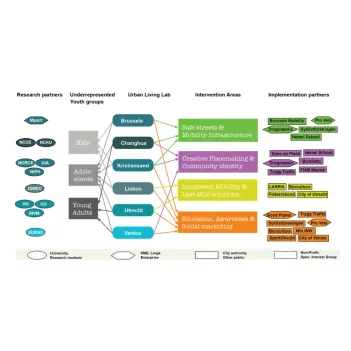YOUTH4MOBILITY
Youth as Agents of Change for Inclusive Urban Mobility in 15-minute Neighbourhoods

© YOUTH4MOBILITY
- Category
- Project
- Call
- DUT Call 2024
- Duration
- –
- Project coordinator
- HU University of Applied Sciences Utrecht
The YOUTH4MOBILITY project explores how to contribute to creating accessible, sustainable, and inclusive 15-minute neighbourhoods through youth-centric active mobility systems for children, adolescents, and young adults. Young people often face unsafe streets, limited affordability, and barriers to participation in shaping active mobility systems, which can result in mobility poverty and unequal access to education, work, and social life. At the same time, cities face the urgent challenge of transitioning towards healthier, more sustainable, and more inclusive transport. YOUTH4MOBILITY responds by analysing youth mobility lifestyles and the systemic drivers shaping active mobility choices. The project empowers youth as agents of change, developing safe, connected, and creative solutions for active mobility that address both the challenges young people face and society’s need for equitable, sustainable urban mobility.
YOUTH4MOBILITY will develop youth-centric active mobility strategies through six Urban Living Labs in Utrecht, Venice, Lisbon, Kristiansand, Brussels, and Changhua (Taiwan). First, it analyses youth mobility lifestyles and the drivers behind mobility choices using participatory action research with diverse communities. Second, it co-creates interventions that re-imagine infrastructure, enhance street safety, strengthen community identity, foster placemaking, and improve last-mile connections, drawing on technology, design, pricing, regulation, and training. Measures such as bike hubs, car-free zones, bike trains, and mobility discounts aim to improve accessibility and affordability. Third, the project re-assesses and evaluates the wider societal impacts of these youth-led solutions on wellbeing, access, and equity. It also builds learning communities to transfer knowledge and develop practical tools for stakeholders. Finally, policy recommendations will be created to guide youth-centred mobility planning and inform policymakers and educational institutions.
The project expects to empower youth as change agents for active mobility that is safe, creative, and connected. It will deliver youth-led interventions that enhance accessibility, affordability, and safety, while reducing mobility poverty and promoting healthier transport habits. Broader impacts include improved wellbeing, greater equity in access to education, jobs, and social life, and stronger community cohesion. YOUTH4MOBILITY will also generate practical tools, co-creation methods, and stakeholder learning communities to ensure replication of successful approaches. Open knowledge platforms, training materials, and evaluation frameworks will support transferability across different contexts. Finally, the project will produce policy recommendations that guide youth-centred mobility planning in European and international cities, contributing to sustainable, liveable, and resilient 15-minute neighbourhoods that meet the needs of young people and benefit society at large.
Belgium
Italy
Norway
Portugal
Taiwan, Province of China
The Netherlands
Accademia Europea di Bolzano (EURAC), Bicicultura CRL, Comune di Venezia, Folkehelseinstituttet, GoodPlanet Belgium, Instituto de Engenharia Mecânica, Kristiansand kommune, MPACT, National Changhua University of Education, NCKU, National Cheng Kung University, Norwegian Research Centre (NORCE), Pro Velo - Institut de Recherche et de Promotion du Vélo, Utrecht University, Universitetet i Agder
Changhua County Hemei High School (HMSH), Companhia Carris de Ferro de Lisboa, Dragonpolis Engineering Consulting Co., Ltd., EIT Urban Mobility Innovation Hub West B.V., Eyes on Place, Fiab Mestre - Amici Della Bicicletta, Fietsersbond, Gemeente Utrecht, Ministerie van Infrastructuur en Waterstaat, Norwegian Council for Road Safety, RIVM, Service Public Régional de Bruxelles, SportUtrecht, Syklistforeningen
Contact
Stephanie Geertman
stephanie.geertman@hu.nl